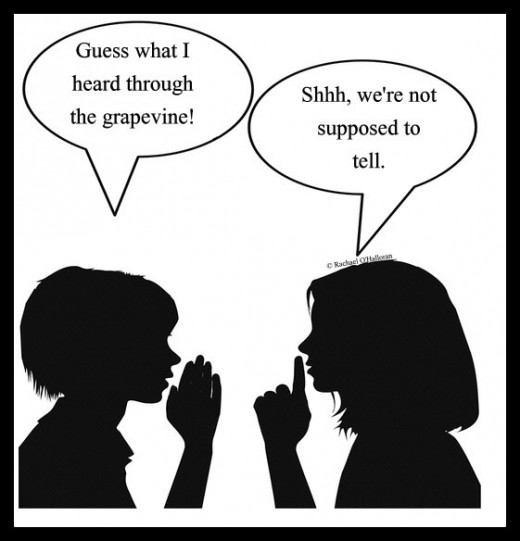House For Sale: The Case Of A Murder-Suicide
by Rachael O'Halloran
Published July 29, 2014
Guess what I heard ...


Seller Disclosure
Generally, in most states in the United States, home sellers must disclose any material or structural defect (that they are aware of) in the home and list it on a "Seller's Disclosure Form," which is then placed in a packet with their realtor.
Potential buyers (and their realtors) have access to this form so they know how old the roof is, the age of the kitchen, baths and any additions, and if there has been any flood or termite damage, etc. Usually the supplied information is purely material, not anecdotal or "psychological."
Example: If your husband died in your house due to committing suicide, it might be a point of interest to some buyers, especially to those who rather not live in a house where someone died in it, but it really doesn't have anything to do with how sound the house is structurally.
At an open house, it is not too likely that potential buyers will think to ask: "Has anyone ever died in this house?"
Likewise, a seller does not have to disclose that a crime had occurred in the home - either during the time they owned it or before - be it a home break in, or a murder.
But what happens when the neighbors tell the new homeowner all about it?
That's exactly what happened in this case.
~~*~~*~~*~~*~~*~~*~~*~~*~~*~~*~~*~~*~~*~~*~~*

Background
On February 11, 2006, Konstantinos Koumboulis, age 50, shot himself and his 34 year old wife Georgia, in a murder-suicide inside their home in a suburb of West Chester, outside of Philadelphia. The crime was witnessed by the oldest of the couple's children who called 911. Their three children ranged in age from 7 to 13.
For about 24 hours, the story was a big topic of conversation on the internet, and it made front page news in local newspapers as well as a mention on nightly news broadcasts all over the United States. By February 12, 2006, it was old news for the media, but it would become the topic of neighborhood lore for years to come.
~~*~~*~~*~~*~~*~~*~~*~~*~~*~~*~~*~~*~~*~~*~~*
The home was put up for sale in March 2006 by the Koumboulis Estate.
With no buyer prospects after six months, the home was put up for auction and sold for $450,000 to Kathleen and Joseph Jacono on September 23, 2006.
The Jaconos learned about the murder-suicide while at the auction, but it didn't matter to them. They had no intention of living in the home. They were going to invest some money to rehab it, then flip the home for a profit.
~~*~~*~~*~~*~~*~~*~~*~~*~~*~~*~~*~~*~~*~~*~~*
Would you buy?
Would you buy a house where a gruesome murder or murder-suicide had occurred in the very recent past?

The New Buyer
After investing thousands of dollars in rehabbing, the Jaconos listed the house for sale on June 4, 2007 at $610,000. The Jaconos told their realtor that they didn't want the murder-suicide mentioned to potential buyers or stated anywhere in the seller's disclosure documents, saying it would hurt their chances to sell the house at a good price.
The realtor was concerned about ethics and decided to seek advice from the Pennsylvania Real Estate Commission and the Pennsylvania Association of Realtors, and was told that although it would be a common courtesy to do so, the sellers were not required to disclose the murder-suicide to any potential buyers.
The realtor relayed the advice to the sellers, who reminded the realtor that the seller disclosure documents clearly stated that only "known material defects" must be disclosed and that murder-suicide was not a material defect. They felt sharing such knowledge would degrade the value of the property.
~~*~~*~~*~~*~~*~~*~~*~~*~~*~~*~~*~~*~~*~~*~~*
Gossip

Heard Through The Grapevine
On June 17, 2007, Janet Milliken, then residing in California, signed an agreement of sale for the purchase price of $610,000. She decided to move back to Pennsylvania with her two children, while still in mourning for the recent death of her husband, which happened in their home in California.
When Janet Milliken entered into the sale agreement, the Seller Property Disclosure Statement she received only said that the property was last occupied about March 2006, that the Jaconos had owned it for 7 months and that there were no material defects.
After settlement, Janet Milliken moved her family into the house in September 2007 and within three weeks, she learned about the murder-suicide from the neighbors. She decided not to tell her children, but they learned about it anyway while trick or treating on Halloween.
She considered her options and in November 2008, Janet Milliken filed a lawsuit in a Pennsylvania court against the realtors for both parties, and against the sellers Kathleen and Joseph Jacono alleging fraud, negligent misrepresentation and violation of the Unfair Trade Practices and Consumer Protection Laws.
In her lawsuit documents, she stated that she would never have gone through with buying the house if she had known about the "psychological damage."
~~*~~*~~*~~*~~*~~*~~*~~*~~*~~*~~*~~*~~*~~*~~*
The wheels of justice turn slowly, so that nearly two years later, in 2010, a Superior Court judge in Pennsylvania issued the ruling that material defects are the only issues that the real estate law says a seller must disclose to a buyer.
- "We find that psychological damage to a property cannot be considered a material defect in the property which must be revealed by the seller to the buyer."
The case was dismissed and Plaintiff Milliken appealed to a higher Pennsylvania Superior Court.
~~*~~*~~*~~*~~*~~*~~*~~*~~*~~*~~*~~*~~*~~*~~*
Murder
If a murder happened long ago in a home you were going to buy, would you still want to know about it?

The Question In Question
All sellers are obligated to answer: "Are you aware of any material defects to the property, to the dwelling or to the fixtures which are not disclosed elsewhere on this form?"
Pennsylvania Law defines "Material defect" as: A problem with a residential property or any portion of it that would have a significant adverse impact on the value of the property or that involves an unreasonable risk to people on the property. The fact that a structural element, system or subsystem is near, at or beyond the end of the normal useful life of such a structural element, system or subsystem is not by itself a material defect."
Even though there is no law which said a seller had a duty to do so, the buyer was asking the Supreme Court if they would rule that a seller was required to disclose a past murder-suicide on or in the property on the Seller Disclosure Statement.
Settled

Rulings
Plaintiff Milliken appealed to the highest Superior Court in Pennsylvania, asking for a jury trial to not only determine if non-disclosure was fraud, but to also award monetary damages in her favor. The only thing she did differently in this appeal was she introduced two real estate appraisals to show that the crimes had diminished the value of the property by 10 to 15 percent.
She didn't get the jury trial she wanted, but she did get a surprise.
In 2011 a three judge panel surprisingly reversed the decision of the lower court in favor of Milliken, the buyer.
The Superior Court ruled that the seller's failure to disclose the murder-suicide amounted to common law fraud because of the misrepresentation in the documents that there were no other "problems" with the property. The Court felt that the sellers should have included notice of the murder-suicide in the summary part of the disclosure form that asks sellers to disclose any material defects “not disclosed elsewhere on this form.”
The three judge panel went on to admonish the sellers and the realtors for making inquiries to the Pennsylvania Real Estate Commission and the Pennsylvania Association of Realtors stating that if the question of disclosure was important enough to seek advice, then clearly the disclosure should have been made.
The court said that instead of putting forth all the investigative effort, they would have been better off simply acting in good faith to just disclose the grizzly fact up front.
Plaintiff Milliken had a very short-lived victory because after receiving many friend of the court letters, the same Court decided to reconsider their position in December 2012.
The new ruling stated that "psychological damage" cannot be considered a material defect and that a seller does not have to report it to a buyer.
Superior Court Judge Emeritus Kate Ford Elliot wrote for the presiding judges: “Today, we find that psychological damage to a property cannot be considered a material defect in the property which must be revealed by the seller to the buyer.”
"The sellers did not engage in any deceptive conduct. The sellers merely declined to inform Buyer about a factor of which they were under no obligation to disclose," Elliott wrote. This reversed their 2011 ruling and the judgment was made for the sellers.
The sellers, the realtors and the pundits who followed this case all felt this ruling settled the issue once and for all. Plaintiff Milliken did not.
~~*~~*~~*~~*~~*~~*~~*~~*~~*~~*~~*~~*~~*~~*~~*
In January 2013, Plaintiff Milliken appealed all the way up to the Pennsylvania Supreme Court, the only court in the state which could reverse the Superior Court's decision regarding disclosing information about "stigmatized properties."
A state Supreme Court is the last pit stop either party can go to seek a favorable ruling. The only place after this is the United States Supreme Court in Washington, DC who can reverse any ruling of any court in the country.
In July 2013, the Pennsylvania Supreme Court began their year-long consideration of the appeal and they rendered their ruling last week, on July 21, 2014.
The parties learned the ruling was essentially the same as the lower court:
"Psychological damage" to a property is not a material defect and does not have to be disclosed in the Seller Disclosure Statement. The judgment was again for the sellers.
~~*~~*~~*~~*~~*~~*~~*~~*~~*~~*~~*~~*~~*~~*~~*
Questions To Ponder
How recent must the murder be to warrant a disclosure to a buyer?
Would 25, 50, or 100 year old crimes have to be revealed?
Should disclosure just pertain to murder, or should other crimes be revealed too?
If heinous crimes were to be revealed and assuming sellers could sell their property, can they really expect to make a decent profit?
As a buyer, would I want to know about the crimes beforehand?
~~*~~*~~*~~*~~*~~*~~*~~*~~*~~*~~*~~*~~*~~*~~*
Disclosure
Should seller disclosure be limited to gruesome murders, or must other gruesome crimes be revealed also?
Epilogue
After the Supreme Court's decision, buyers shouldn't assume that sellers have any duty to disclose past gruesome or traumatizing events occurring on the property.
In the age of the internet, buyers have many tools at their disposal in order to be able to uncover the history of not only their house, but of the neighborhood, and the city and state.
~~*~~*~~*~~*~~*~~*~~*~~*~~*~~*~~*~~*~~*~~*~~*

Thank you for not copying my article

© Rachael O'Halloran, July 29, 2014
© 2014 Rachael O'Halloran








